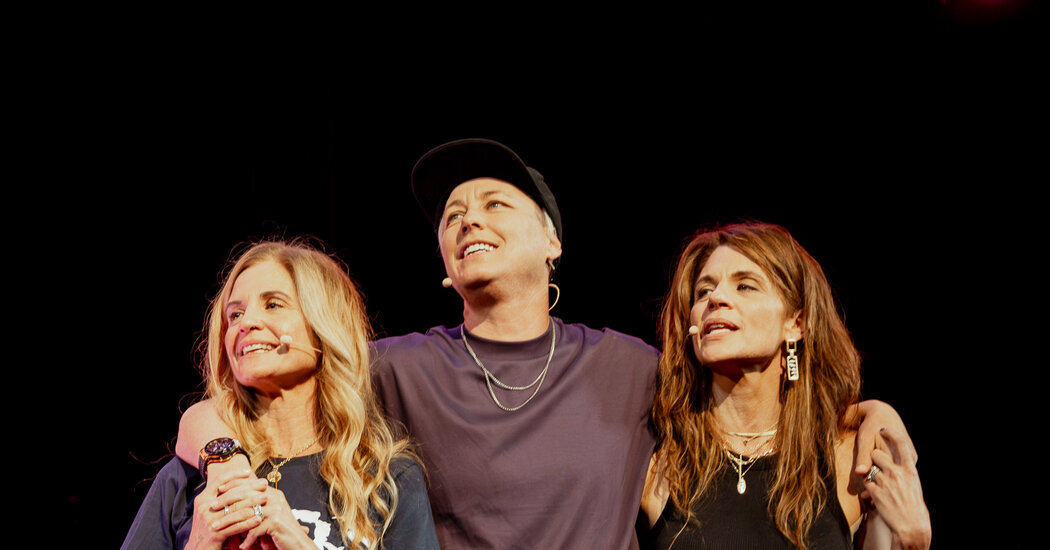Susan Hagen, 48, was practically vibrating with excitement. She would soon be in the same room with three women who had helped her through some of the shakiest, most vulnerable moments in her life, even though they didn’t know it.
Hagen, a New Jersey resident, had braved the pouring rain and Times Square crowds to attend a sold-out talk by the best-selling memoirist Glennon Doyle; her soccer Hall of Famer wife, Abby Wambach; and Amanda Doyle, Glennon’s sister and co-founder of the women’s media company — hosts of the podcast “We Can Do Hard Things.”
“The podcast has gotten me through so many things,” Hagen said, noting that she had read Glennon’s 2020 memoir, “Untamed,” no less than four times. Much like the author, Hagen got divorced and came out as gay in her 40s. The books, the podcast, all of it helps her feel as if she is not alone, she said.
It’s a sentiment I heard again and again when speaking to fans (mostly women) who filled the Town Hall theater in Manhattan on Monday — the woman in her 70s who, like Glennon, has been in eating disorder recovery for years; the queer woman in her 40s who, like Wambach, is navigating the ups and downs of stepparenting; the lawyers who give “Untamed” to clients reeling from the messiness of divorce.
“We can do hard things” has long been gospel for Glennon stans — it’s the title of the trio’s new book, out this week. The project was born, the women say, out of concurrent personal crises that walloped them as hard as anything had so far in their lives. They started writing it as a survival guide for themselves as much as anyone else.
Over the course of a year, Wambach’s oldest brother, Peter, died unexpectedly; Glennon, who had struggled with disordered eating throughout her life, was diagnosed with anorexia; and Amanda was treated for breast cancer.
“For the first time,” Glennon wrote, “we were all drowning at the same time.”
At roughly 500 pages long, the new book is a compilation of snippets from conversations the women have had with 118 podcast guests they call “wayfinders” (in a metaphorical sense) — including Justice Ketanji Brown Jackson and their celebrity pals, like Elizabeth Gilbert and Brandi Carlile. The quotes are themed around what the authors believe to be the 20 life questions people tend to ruminate over. Among them: Why am I like this? How do I figure out what I want? Why can’t I be happy?
Though the “We Can Do Hard Things” crew are superstars in the self-help world, they are collectively confronting a kind of midlife existential ache and throwing up their hands as if to say: We don’t have any answers!
“I have these glimpses where life makes sense for, like, a millisecond at a time,” Amanda, 47, a lawyer who is known as “Sister” on the show, told me during an hourlong Zoom call with the threesome shortly before they were to head out on tour. But soon enough, she admitted, “I am back in a place where I am angry at everyone in my life, and I don’t know why I feel like crap, and suddenly that elusive peace is gone.”
Aiming for ‘51 Percent’
When I spoke to the women, the mood was friendly but subdued. They listened to one another attentively, occasionally chiming in with a “yes,” or “that’s good!” Glennon, who in “Untamed” exhorted women to tap into their inner, wild cheetahs, seemed especially reflective.
“It’s very funny because all of my work before this was like, ‘Look inside yourself, there are the answers,’” Glennon, 49, said. “Now at 50 I’m like, hmm. Sometimes I look inside myself, and myself is very confused.”
Though the women regularly field listener questions on the podcast — and quote themselves throughout the book — they bristled when I asked whether they were surprised that people would come to them for advice. Even the word feels “icky,” Amanda said. The women simply tell the truth about their life experiences, she insisted, without shame. And they are unafraid to ask hard, ugly questions.
“We backed into these questions, because over 400 conversations with the wisest people we know, it was obvious they were dealing with the same questions,” Amanda said. “If Brandi Carlile and Michelle Obama and Ina Garten and Roxane Gay are all struggling with these same things, it makes me feel like: ‘Oh, it’s just the human condition. It’s not that I’m failing to figure out life. It’s that this is the way life is.’”
These days, Glennon lives by the axiom that life is 49 percent “brutal,” she said, “just nonsensical mess.” But it is also 51 percent beautiful, and that 51 percent is what keeps her going. (The authors dedicated the book to their children with the inscription: 51 percent.)
Her wife has embraced the Glennon-ism as well. “I’ve won gold medals,” Wambach, 44, said. “I’ve won world championships. Many people would say, ‘OK, you were living at 100 percent there!’ But my internal life didn’t experience that 100 percent.” Wambach struggled with depression and abused alcohol and prescription pain medications. She got sober after a very public D.U.I. arrest in 2016.
Now, on any given day, if she experiences 51 percent “enough-ness” and “contentedness,” Wambach said, “that was a banger of a day.”
The Pod Squad
Glennon admitted that sometimes when she shares ideas that she finds inspirational — like the 51 percent concept — with people in her life, they tell her, “That’s the most depressing thing I’ve ever heard,” she laughed. But the “We Can Do Hard Things” audience, the highly engaged Pod Squad, doesn’t seem to mind. Every week, several million listeners tune into episodes on topics like friendship, sex, loss, parenting and politics.
The crowd on Monday was rapturous — murmuring appreciatively when Amanda confessed to feeling emotionally stuck after her cancer diagnosis and erupting into laughter as Glennon told a story about a recent foray into microdosing mushrooms. They cheered when the women, who are outspoken critics of President Trump, joked about the political might of menopausal women, and belted along earnestly as Tish Melton, Glennon’s 19-year-old daughter, closed out the show with her original song “We Can Do Hard Things.” (It is the podcast’s theme song.)
But the women inspire equally fervent dislike as well, with some observers accusing them of navel-gazing and narcissism. Glennon recently quit social media — a change she said was as good for her heart and nervous system as quitting drinking was — and began a paywalled newsletter on Substack to avoid trolls, she said. She abruptly left the platform amid accusations she was siphoning off readers from less-established writers. “I thought it might feel different than social media,” she wrote in an email after the New York show. “It didn’t.”
A side effect of being very public people — who talk about very personal stuff — is that the women seldom make it through the grocery store without someone confiding in them, or asking a difficult question.
Glennon, an avowed introvert, tries to see those interactions as a two-way street: If she has built a following based on being raw and vulnerable, she expects fans to roll with it if she is candid with them about catching her on a bad day.
“I actually don’t have to put on a fake smile, entertain, be a fake version of myself in that moment,” Glennon said, seemingly to herself as much as to me. “That’s what I tried to do for 10 years, to constantly make the other person comfortable, because I felt like I owed the moment something. And that made me very tired and confused and stressed out.”
But the Pod Squad seems to find comfort in the women’s commitment to honesty and in their aversion to the idea that anyone — least of all them — has the answers.
“There’s a difference between saying to people, ‘Here’s a map,’” Glennon told me, “and saying to people, ‘Here are some snapshots from the trip I took when I walked that road.’”





